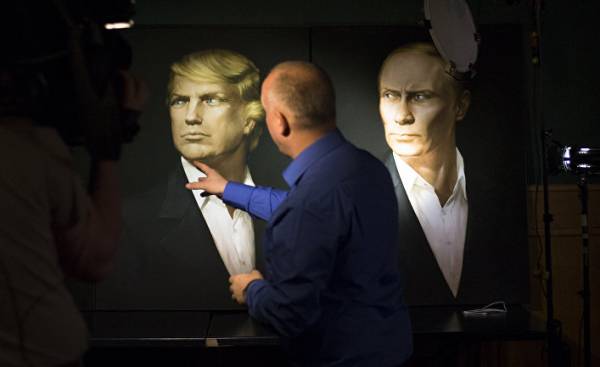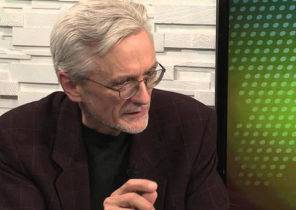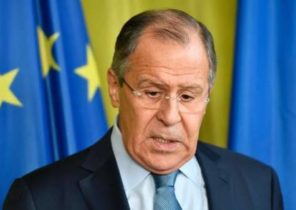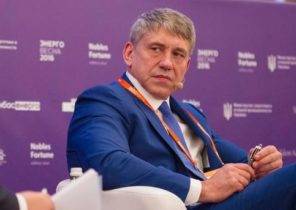
This is only part of what they say about the President of the Russian Federation Vladimir Putin. Although, when it comes to Putin, American policy promotes the unwinding designed for a TV audience in the drama between rival politicians, these insults are counterproductive for any future negotiations.
Donald trump fell into the other extreme, full of praise for Putin: “he is much stronger leader than our (President) Obama… I think he brilliantly outsmarted our country.”
But this rhetoric is neither one nor the other — just doesn’t work. Putin ignores insults. The Russian, who consume the products of anti-Western state media, these attacks have outraged, and praise the Russian leader did not budge.
During the election campaign in the United States Russian inspired American presidential candidate, who, it seemed, wanted to “get along” with their President and which would, in their opinion, to do away with attempts to punish and isolate Russia.
The Kremlin acted more carefully. Putin, a former KGB officer, understands people and their behavior. Publicly, he reacted positively. Unofficially, he and other Russian officials have taken a wait.
Now the administration trump is mired in investigations of hacker attacks, Russia has undertaken, and its interference in elections in 2016, “Russian theme” has created an unhealthy political atmosphere, and now the relations (between countries) as never strained.
But refusing to speak with Putin will not solve the problem. Although Putin intervened in the US presidential election (and it is suspected that the same effect in respect of the election of a number of European countries), although it invaded the Ukraine, illegally annexed Crimea and too long supports Syrian leader Bashar al-Assad, the strategy of the announcement to him of the boycott and refusal to speak with him, would be wrong.
And the administration of the tramp in some degree understands it. Secretary Rex Tillerson few weeks ago has arrived in Moscow and met with Putin amid escalating tensions around Syria.
And this dialogue must continue. USA and Russia — the world’s two largest nuclear powers. And if together they will not engage those issues that cannot be solved without cooperation — including the Syrian civil war is becoming increasingly dangerous North Korea and an unstable, fluctuating Iran is facing imminent disaster.
So how do American politicians should — or should not — speak with Putin?
Well, it is important to start with respect. To criticize Putin in public is not a very sensible strategy, if in the future you will have to agree with him eye to eye.
Putin is fully absorbed in order to restore the dignity of Russia and its role as a great power.
Angela Stent (Angela Stent), Director of the Center for Eurasian, Russian and East European studies at Georgetown University, told me: “Excessive and senseless criticism or praise of President Putin — indeed it is inappropriate and illogical”.
“This clearly strengthens his belief, it strengthens the suspicion that the United States is interested in regime change not only in other parts of world or in Russia’s neighboring countries, but in Russia itself,” she explains.
Putin himself accused the then US Secretary of state Hillary Clinton for what she “sent a signal to some activists inside the country” to the beginning of anti-government protests on the streets of Moscow and other cities in 2011-2012. He believes that Washington was the instigator of the Georgian “rose revolution” in 2003, the “orange revolution” in Ukraine in 2004 and even uprisings of the “Arab spring” that began in January 2011. Russia, in his opinion, is on the U.S. list of countries for “regime change”.
But in the case of Putin or hostile remarks in his address, nor protestations of sympathy for him no action will not conceive.
In 2001, President George W. Bush told the world that he looked into Putin’s eyes and “was able to understand his soul”, but in the end it did not prevent countries sliding into tension.
In 2013, President Barack Obama went to the person immediately after Putin granted asylum in Moscow Edward Snowden, a former CIA officer, who gave secret information.
“He has such a manner of sitting, lounging, he looks like a student, bored in the back row,” said Obama. Putin has not responded publicly, but the words were another blow that destroyed relations between the two countries.
“The way you talk to face to face, and the way you talk about him in public are two different things,” said former U.S. Ambassador to Russia John Byerly (John Beyrle).
According to Byerly, when it comes to public statements about Putin (or any other world leader), “the main thing is to make sure that the criticism was directed at policy or official statements, and not stoop to the level of inappropriate personal insults”.
Disparaging remarks about Putin, may produce the desired result in the US, but it is fraught with consequences — such rhetoric can provide food for Russian anti-American propaganda that portrays the United States as a clumsy elephant in a China shop.
During the election campaign in the United States Russian media as an instructive example, pointed to internal contradictions in America, its “chaotic” democracy for the edification of his own people of Russia. Now, when American officials went to the person and started to hang labels on the international level, these emotional outbursts only reinforce the impression that America is out of balance.
Veteran Russian in both countries concerned. They survived the cold war and the fear that this war of words can cause real damage.
During the cold war confrontation between the Soviet Union and the United States was based on ideology and competition between two economic systems. Despite this, the two countries failed to agree on arms control and other measures to strengthen international stability.
Today, ironically, agreement on how to make the world more stable, much less. To throw personal insults — or even scattered in courtesies before another leader, expressing the vague hope of “getting along” is not to do anything real in order to identify common interests and identify potential areas of cooperation.
Andrew Kuchins (Andrew Kuchins) in its new report on Russia and its new policies toward the United States (Elevation and Calibration: A New Russia Policy for America), prepared for the Center for global interests (Center on Global Interests), writes: “the First thing is to make the President-elect is to talk about Russia and its President are respectful, balanced and business-like. Random, but degrading the statements of the leaders of the United States are a welcome pretext for further incitement of anti-Americanism in Russia and counterproductive to achieving the broader objectives of American foreign and security policy, which requires cooperation with Russia.”
Personal meeting trump and Putin will happen sooner or later. And then it is neither laudatory tweets trump Putin, nor the Minister of defence on “the inadequacy of Putin” will not be enough. Putin, who led Russia for almost 17 years, empty rhetoric does not and is a very tough negotiator.
Just ask Beyrle 10 times, attending meetings with Putin, who, since 1999, has been President and Prime Minister.
“Probably to talk with him was the most effective, you need the ability to listen, — said Byerly. — He is demanding conversationalist, able to speak for 40 minutes or longer, presenting detailed, rich data and information without using notes. The main thing that can make him listen to you — it is your ability to comprehend all of this information and to respond to each of his theses, many of which require critical evaluation and discussion.”
Time to set Putin is sober, objective relationship based on respect. He is the elected President of a country that has a huge importance in the fight against global threats from nuclear proliferation to cyber warfare. He is doing everything possible in order to maximize this advantage of his country.
Visionary, sensible and rational actions has to be stronger than emotional rhetoric.







